Overview
- Brief Narrative
- Japanese matchbox acquired postwar by Ralph (Ralf) Harpuder. This box features an image of planes flying over a sinking ship with a United States flag. Four year old Ralf, his parents, Hans and Gerda, and his 14 year old sister, Ursula, left Berlin, Germany, following Kristallnacht on November 9-10, 1938. They left for Shanghai because it was an open port with no visa required and arrived in March 1939. Shanghai was controlled by the Japanese military and as the war intensified, they were relocated to the Hongkew ghetto. Food and supplies became extremely difficult to obtain, but Ralf was able to stay in school because they waived his tuition. The city was liberated by the US Army on September 3, 1945. That October, Ralf's father died of malnutrition. In March 1947, the family emigrated to the United States.
- Date
-
emigration:
1939 March
publication/distribution: approximately 1942
- Geography
-
manufacture:
Japan
- Credit Line
- United States Holocaust Memorial Museum Collection, Gift of Yvonne Harpuder
- Markings
- outer box, front, lower right, black ink : (20[ ])
- Contributor
-
Subject:
Ralph Harpuder
- Biography
-
Ralf Heinz Harpuder was born on April 12, 1934, in Berlin, Germany, to Hans (Hern) and Gerda Lewin Harpuder. Hans was born on November 26, 1901, in Berlin to Gertrude Hannes Harpuder. Gerda was born on November 21, 1905, in Berlin to Joseph and Selma Nathanson Lewin. Selma was born on July 20, 1878, in Mammendorf. Hans worked in sales and took over his father’s factory that manufactured ropes and canvases; Gerda was a shopkeeper. Ralf had one older sister, Ursula, born in 1925. Gerda and Hans married on December 26, 1931.
After Hitler was appointed Chancellor in 1933, anti-Jewish legislation and restrictions became increasingly harsh. Hans’ brothers, Alfred and Erich, emigrated to the United States circa December 1938. After the Kristallnacht pogrom on November 9-10, 1938, Hans lived in hiding with friends to avoid arrest until he could confirm plans to leave Germany. The family decided to leave for Shanghai in Japanese-occupied China because it was an open port with no visa required. In early 1939, the family and Gerda’s mother, Selma, took a train to Trieste, Italy, and boarded the SS Conte Verde. In March, they arrived in Shanghai and a Jewish organization transported the family to a refugee boarding home in the Hongkew district. Their possessions were sent to Shanghai by a German man who was an expediter for a van and storage company. They sold many of those valuables which provided them with enough money to live in their own apartment and co-own a delicatessen with Gerda’s cousin, Kaethe Benjamin. The store closed after a year and Hans started an ice block company. The family was active in the Jewish community and celebrated the high holidays in rented movie theaters. Ralf attended a Jewish refugee school, the Kadoorie school, and learned Japanese. He played with other immigrant children and Japanese children in the remnants of bombed buildings. He went to the movies often and collected and traded cigarette sleeves with the other children.
After the Japanese attack on Pearl Harbor in December 1941, the family stopped receiving correspondence from family in Germany. In 1943, Japanese authorities ordered that all Jewish refugees move into a ghetto in the Hongkew district. Their landlord, who was a Jewish refugee, with the help of Japanese authorities, forced the family to move because he wanted the apartment for himself. They lived in one room of a shared apartment with three other families in a less affluent area called Little Vienna because of all the coffeehouses. They had to purchase hot water in a kettle to take sponge baths. Food and support became harder to obtain from Jewish organizations. Hans worked as a sales person for a candy company and Ralf sometimes stole candy from his sample box. Hans had to obtain passes from the Japanese official, Kanoh Ghoya, to sell goods outside the ghetto. Gerda worked in a rag factory and Ursula worked as a beautician. Ralf transferred to a nearby school, the Freysinger school, a private Jewish refugee school. The family could not afford it but the principal allowed him to attend without paying tuition. He also attended Talmud Torah, an afternoon Hebrew school that was very strict, but he returned every year because the students received new shoes. On July 17, 1945, Shanghai was heavily bombed by United States forces. Gerda and Ralf were outside during the bombing. They ran inside a building and Gerda covered his head and prayed. After the air raids, Ralf could smell the stench of burning bodies.
Shanghai was liberated by the US Army on September 3, 1945. An American soldier who was friends with one of Hans’ brothers in New York brought the family canned goods. In October 1945, Hans died of malnutrition and hook worms. The family learned that Hans's sister, Genia Gritz Harpuder, was killed in Stutthof concentration camp in 1945. Ralf's paternal grandmother and cousin, Gertrude and Peter, died in Auschwitz death camp. Gerda’s brother, Werner, emigrated to California before the war and obtained papers for Ralf, Gerda, Ursula, Max, and Selma to emigrate to the US. While in Shanghai, or possibly in Australia, Ursula married Max Kopstein, a soccer player who was a Jewish refugee from Vienna. In March 1947, they sailed on the SS General Gordon and settled in Los Angeles. Two weeks after arriving, Ralf celebrated his Bar Mitzvah. Werner enrolled him in junior high school and changed his name to Ralph Harper. In 1950, Gerda married Viktor Stummer. They met in 1941 when Gerda asked Viktor to repair a candlestick. Viktor had fled from Vienna to Shanghai in 1938. After high school, Ralph changed his last name back to Harpuder. Selma passed away on May 4, 1958, age 79. In 1965, Ralph married Yvonne Fenton, whose parents had come to the US around 1938 after securing US visas on their honeymoon in Switzerland. Yvonne's grandfather, Isidor Abraham, and uncle, Kurt, lived in Shanghai during the war. Ralph and Yvonne had one son. Gerda passed away on November 22, 1996, age 91. Viktor passed away in 2003, age 94. Ralph passed away on July 31, 2009, age 74.
Physical Details
- Language
- Japanese
- Classification
-
Personal Equipment and Supplies
- Category
-
Smoking paraphernalia
- Object Type
-
Pocket matchboxes (lcsh)
- Physical Description
- Rectangular, thin paper covered wooden matchbox with an outer cover with open short sides that slides over an inner drawer. The cover has an abrasive black striker panel on the long sides. The face of the cover has a printed image of a white plane wing with the red Rising Sun symbol of Japan against a greenish blue background. The lower half of the image shows small black planes flying over a sinking yellow ship flying a torn American flag on a black mast. There are Japanese characters printed in black ink near the upper center and in white ink on a dark blue border near the lower center.
- Dimensions
- overall: Height: 0.750 inches (1.905 cm) | Width: 1.500 inches (3.81 cm) | Depth: 2.250 inches (5.715 cm)
- Materials
- overall : wood, paper, ink
Rights & Restrictions
- Conditions on Access
- No restrictions on access
- Conditions on Use
- No restrictions on use
Keywords & Subjects
Administrative Notes
- Legal Status
- Permanent Collection
- Provenance
- The matchbox was donated to the United States Holocaust Memorial Museum in 2010 by Yvonne Harpuder, the widow of Ralph Harpuder.
- Funding Note
- The cataloging of this artifact has been supported by a grant from the Conference on Jewish Material Claims Against Germany.
- Record last modified:
- 2022-07-28 21:51:09
- This page:
- https://collections.ushmm.org/search/catalog/irn50345
Download & Licensing
In-Person Research
- By Appointment
- Request 21 Days in Advance of Visit
- Plan a Research Visit
- Request to See This Object
Contact Us
Also in Ralph Harpuder family collection
The collection consists of artifacts, correspondence, documents, newspapers, and photographs relating to the experience of Ralph (Ralf) Harpuder and his family in Berlin, Germany, before the Holocaust, in Shanghai, China, during and after World War II, and in the United States following their emigration in 1947, and of Ralph's stepfather, Viktor Stummer, in Vienna, Austria, before the Holocaust and in Shanghai during and after the war. Some of these materials may be combined into a single collection in the future.
Date: 1915-2008
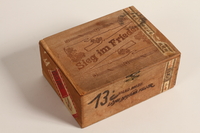
Engraved wooden Havana cigar box acquired by Austrian Jewish refugee
Object
Wooden cigar box acquired by Viktor Stummer in Shanghai, China. He fled there from Vienna, Austria, circa December 1938, following his release from Dachau concentration camp. He was imprisoned during Kristallnacht that November 9-10 and released after his sister secured him a ticket to Shanghai. He lived in the Hongkew ghetto and worked as a welder. Shanghai was liberated by the US Army on September 3, 1945. In 1949, Viktor emigrated to Canada and the next year he moved to the US where he married a fellow Shanghai refugee, Gerda Harpuder. They met in Hongkew in 1941 when Gerda asked Viktor to repair a candlestick. Gerda escaped Berlin, Germany, in early 1939 with her husband, Hans, and children, Ursula, age 14, and Ralf, age 4. Hans died of malnutrition in October 1945. Gerda and her family emigrated to the US in March 1947.

Painted tin container base owned by a German Jewish refugee
Object
Tin container, missing the lid, that belonged to Ralph (Ralf) Harpuder who fled Germany in 1939 for Shanghai, China. A ring traveller was a device used with textile spinning looms. Four year old Ralf, his parents, Hans and Gerda, and his 14 year old sister, Ursula, left Berlin following Kristallnacht on November 9-10, 1938. They went to Shanghai because it was an open port with no visa required and arrived in March 1939. Shanghai was controlled by the Japanese military and as the war intensified, they were relocated to the Hongkew ghetto. Food and supplies became extremely difficult to obtain, but Ralf was able to continue school because they waived his tuition. The city was liberated by the US Army on September 3, 1945. That October, Ralf's father died of malnutrition. In March 1947, the family emigrated to the United States.
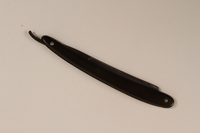
Straight razor in a black plastic cover brought to Shanghai by an Austrian Jewish refugee
Object
Straight razor kept by Viktor Stummer when he fled from Vienna, Austria, to Shanghai, China, circa December 1938, following his release from Dachau concentration camp. He was imprisoned during Kristallnacht that November 9-10 and released after his sister secured him a ticket to Shanghai. He lived in the Hongkew ghetto and worked as a welder. Shanghai was liberated by the US Army on September 3, 1945. In 1949, Viktor emigrated to Canada and the next year he moved to the US where he married a fellow Shanghai refugee, Gerda Harpuder. They met in Hongkew in 1941 when Gerda asked Viktor to repair a candlestick. Gerda escaped Berlin, Germany, in early 1939 with her husband, Hans, and children, Ursula, age 14, and Ralf, age 4. Hans died of malnutrition in October 1945. Gerda and her family emigrated to the US in March 1947.
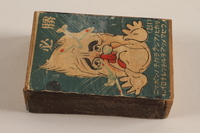
Japanese propaganda matchbox with a caricature of FDR acquired postwar by a German Jewish refugee
Object
Japanese propaganda matchbox acquired postwar by Ralph (Ralf) Harpuder. This box features a caricature of US President Franklin D. Roosevelt. Four year old Ralf, his parents, Hans and Gerda, and his 14 year old sister, Ursula, left Berlin, Germany, following Kristallnacht on November 9-10, 1938. They left for Shanghai because it was an open port with no visa required and arrived in March 1939. Shanghai was controlled by the Japanese military and as the war intensified, they were relocated to the Hongkew ghetto. Food and supplies became extremely difficult to obtain, but Ralf was able to stay in school because they waived his tuition. The city was liberated by the US Army on September 3, 1945. That October, Ralf's father died of malnutrition. In March 1947, the family emigrated to the United States.
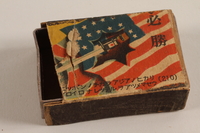
Japanese propaganda matchbox with a Japanese sword piercing the US flag acquired postwar by a German Jewish refugee
Object
Japanese propaganda matchbox acquired postwar by Ralph (Ralf) Harpuder. This box features an image of a samurai sword cutting through the United States flag. Four year old Ralf, his parents, Hans and Gerda, and his 14 year old sister, Ursula, left Berlin, Germany, following Kristallnacht on November 9-10, 1938. They left for Shanghai because it was an open port with no visa required and arrived in March 1939. Shanghai was controlled by the Japanese military and as the war intensified, they were relocated to the Hongkew ghetto. Food and supplies became extremely difficult to obtain, but Ralf was able to stay in school because they waived his tuition. The city was liberated by the US Army on September 3, 1945. That October, Ralf's father died of malnutrition. In March 1947, the family emigrated to the United States.
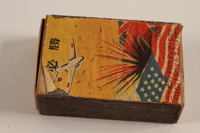
Japanese propaganda matchbox with a Japanese plane bombing the US and British flags acquired postwar by a German Jewish refugee
Object
Japanese matchbox acquired postwar by Ralph (Ralf) Harpuder. This box features an image of a Japanese plane dropping a bomb on the United States and British flags. Four year old Ralf, his parents, Hans and Gerda, and his 14 year old sister, Ursula, left Berlin, Germany, following Kristallnacht on November 9-10, 1938. They left for Shanghai because it was an open port with no visa required and arrived in March 1939. Shanghai was controlled by the Japanese military and as the war intensified, they were relocated to the Hongkew ghetto. Food and supplies became extremely difficult to obtain, but Ralf was able to stay in school because they waived his tuition. The city was liberated by the US Army on September 3, 1945. That October, Ralf's father died of malnutrition. In March 1947, the family emigrated to the United States.
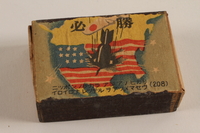
Japanese propaganda matchbox with a bomb exploding in the center of the US acquired postwar by a German Jewish refugee
Object
Japanese matchbox acquired postwar by Ralph (Ralf) Harpuder. This box features an image of a bomb crashing through the center of the flag draped United States. Four year old Ralf, his parents, Hans and Gerda, and his 14 year old sister, Ursula, left Berlin, Germany, following Kristallnacht on November 9-10, 1938. They left for Shanghai because it was an open port with no visa required and arrived in March 1939. Shanghai was controlled by the Japanese military and as the war intensified, they were relocated to the Hongkew ghetto. Food and supplies became extremely difficult to obtain, but Ralf was able to stay in school because they waived his tuition. The city was liberated by the US Army on September 3, 1945. That October, Ralf's father died of malnutrition. In March 1947, the family emigrated to the United States.
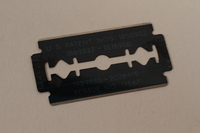
Gillette razor blade, cover and wrapper featuring King C. Gillette brought to Shanghai by an Austrian Jewish refugee
Object
Razor blade, cover and wrapper brought by Viktor Stummer to Shanghai, China, when he fled there from Vienna, Austria, circa December 1938, following his release from Dachau concentration camp. He was imprisoned during Kristallnacht that November 9-10 and released after his sister secured him a ticket to Shanghai. He lived in the Hongkew ghetto and worked as a welder. Shanghai was liberated by the US Army on September 3, 1945. In 1949, Viktor emigrated to Canada and the next year he moved to the US where he married a fellow Shanghai refugee, Gerda Harpuder. They met in Hongkew in 1941 when Gerda asked Viktor to repair a candlestick. Gerda escaped Berlin, Germany, in early 1939 with her husband, Hans, and children, Ursula, age 14, and Ralf, age 4. Hans died of malnutrition in October 1945. Gerda and her family emigrated to the US in March 1947.
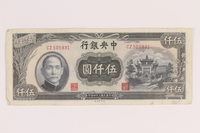
Central Bank of China paper currency note, 5000 yuan, acquired postwar by a German Jewish refugee
Object
Chinese bank note, 5000 yuan, acquired postwar by Ralph (Ralf) Harpuder. It was issued by the Republic of China and this issue was in circulation circa 1945. It features a portrait of Sun Yat-sen and a Pailou style gate. Four year old Ralf, his parents, Hans and Gerda, and his 14 year old sister, Ursula, left Berlin, Germany, following Kristallnacht on November 9-10, 1938. They left for Shanghai because it was an open port with no visa required and arrived in March 1939. Shanghai was controlled by the Japanese military and as the war intensified, they were relocated to the Hongkew ghetto. Food and supplies became extremely difficult to obtain, but Ralf was able to stay in school because they waived his tuition. The city was liberated by the US Army on September 3, 1945. That October, Ralf's father died of malnutrition. In March 1947, the family emigrated to the United States.
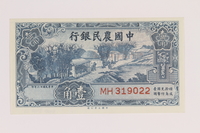
Japanese propaganda resembling a Farmers Bank of China 10 cent note, acquired postwar by a German Jewish refugee
Object
Safe conduct pass resembling Chinese currency acquired postwar by Ralph (Ralf) Harpuder. The Japanese occupation authority created these passes to closely resemble actual currency. This version uses currency issued in 1937 by the Farmers Bank of China. Four year old Ralf, his parents, Hans and Gerda, and his 14 year old sister, Ursula, left Berlin, Germany, following Kristallnacht on November 9-10, 1938. They left for Shanghai because it was an open port with no visa required and arrived in March 1939. Shanghai was controlled by the Japanese military and as the war intensified, they were relocated to the Hongkew ghetto. Food and supplies became extremely difficult to obtain, but Ralf was able to stay in school because they waived his tuition. The city was liberated by the US Army on September 3, 1945. That October, Ralf's father died of malnutrition. In March 1947, the family emigrated to the United States.
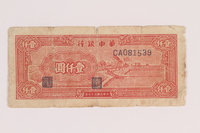
Chinese paper currency note, 1000 yuan, acquired postwar by a German Jewish refugee
Object
Chinese, possibly bank note acquired postwar by Ralph Harpuder. Four year old Ralf, his parents, Hans and Gerda, and his 14 year old sister, Ursula, left Berlin, Germany, following Kristallnacht on November 9-10, 1938. They left for Shanghai because it was an open port with no visa required and arrived in March 1939. Shanghai was controlled by the Japanese military and, as the war intensified, they were relocated to the Hongkew ghetto. Food and supplies became extremely difficult to obtain, but Ralf was able to stay in school because they waived his tuition. The city was liberated by the US Army on September 3, 1945. That October, Ralf's father died of malnutrition. In March 1947, the family emigrated to the United States.
Rolf Harpuder Shanghai report card
Document
Contains Rolf Harpuder's report card from the Shanghai Jewish Youth Association School.
Harpuder family papers
Document
The Harpuder family papers consists of documents, photographs, correspondence, membership and identification cards, newsletters, programs, certificates, newspaper clippings, memoirs, postcards, and photograph albums. This collection documents the experiences of the Harpuder family in Berlin, Germany and Shanghai, China. Also included are correspondence and reunion booklets for the Jewish survivors of Shanghai through the Rickshaw Shanghai Reunion, which occurred during the 2000s.
Glass thermometer with cardboard case taken with Austrian Jewish refugee
Object
Thermometer and case brought by Viktor Stummer to Shanghai, China, when he fled there from Vienna, Austria, circa December 1938, following his release from Dachau concentration camp. He was imprisoned during Kristallnacht that November 9-10 and released after his sister secured him a ticket to Shanghai. He lived in the Hongkew ghetto and worked as a welder. Shanghai was liberated by the US Army on September 3, 1945. In 1949, Viktor emigrated to Canada and the next year he moved to the US where he married a fellow Shanghai refugee, Gerda Harpuder. They met in Hongkew in 1941 when Gerda asked Viktor to repair a candlestick. Gerda escaped Berlin, Germany, in early 1939 with her husband, Hans, and children, Ursula, age 14, and Ralf, age 4. Hans died of malnutrition in October 1945. Gerda and her family emigrated to the US in March 1947.
Blue laced tan leather billfold with an oval image of a man pullling 2 women in a rickshaw acquired by a German Jewish refugee
Object
Decorated leather bifold walllet acquired postwar by Ralph (Ralf) Harpuder. This wllet has the same painted image as 2010.7, except it is set within an oval. Four year old Ralf, his parents, Hans and Gerda, and his 14 year old sister, Ursula, left Berlin, Germany, following Kristallnacht on November 9-10, 1938. They left for Shanghai because it was an open port with no visa required and arrived in March 1939. Shanghai was controlled by the Japanese military and as the war intensified, they were relocated to the Hongkew ghetto. Food and supplies became extremely difficult to obtain, but Ralf was able to stay in school because they waived his tuition. The city was liberated by the US Army on September 3, 1945. That October, Ralf's father died of malnutrition. In March 1947, the family emigrated to the United States.
Red laced brown leather billfold with an image of a man pulling 2 women in a rickshaw acquired by a German Jewish refugee
Object
Decorated leather bifold wallet acquired postwar by Ralph (Ralf) Harpuder. Four year old Ralf, his parents, Hans and Gerda, and his 14 year old sister, Ursula, left Berlin, Germany, following Kristallnacht on November 9-10, 1938. They left for Shanghai because it was an open port with no visa required and arrived in March 1939. Shanghai was controlled by the Japanese military and as the war intensified, they were relocated to the Hongkew ghetto. Food and supplies became extremely difficult to obtain, but Ralf was able to stay in school because they waived his tuition. The city was liberated by the US Army on September 3, 1945. That October, Ralf's father died of malnutrition. In March 1947, the family emigrated to the United States.
Knight cigarette package wrapper collected in Shanghai by a German Jewish refugee
Object
Knight cigarette package label collected and traded by Ralf Harpuder in Shanghai, China. This wrapper features an image of an armored knight on a horse. Four year old Ralf, his parents, Hans and Gerda, and his 14 year old sister, Ursula, left Berlin, Germany, following Kristallnacht on November 9-10, 1938. They left for Shanghai because it was an open port with no visa required and arrived in March 1939. Shanghai was controlled by the Japanese military and as the war intensified, they were relocated to the Hongkew ghetto. Food and supplies became extremely difficult to obtain, but Ralf was able to stay in school because they waived his tuition. The city was liberated by the US Army on September 3, 1945. That October, Ralf's father died of malnutrition. In March 1947, the family emigrated to the United States.
Lux cigarette package wrapper collected in Shanghai by a German Jewish refugee boy
Object
Lux cigarette package label collected and traded by Ralf Harpuder in Shanghai, China. This wrapper features an image of a sports player within a red football. Four year old Ralf, his parents, Hans and Gerda, and his 14 year old sister, Ursula, left Berlin, Germany, following Kristallnacht on November 9-10, 1938. They left for Shanghai because it was an open port with no visa required and arrived in March 1939. Shanghai was controlled by the Japanese military and as the war intensified, they were relocated to the Hongkew ghetto. Food and supplies became extremely difficult to obtain, but Ralf was able to stay in school because they waived his tuition. The city was liberated by the US Army on September 3, 1945. That October, Ralf's father died of malnutrition. In March 1947, the family emigrated to the United States.
Garbor cigarette package wrapper collected in Shanghai by a German Jewish refugee boy
Object
Garbor cigarette package label collected and traded by Ralf Harpuder in Shanghai, China. This wrapper features an image of a woman’s profile with an art deco design. Four year old Ralf, his parents, Hans and Gerda, and his 14 year old sister, Ursula, left Berlin, Germany, following Kristallnacht on November 9-10, 1938. They left for Shanghai because it was an open port with no visa required and arrived in March 1939. Shanghai was controlled by the Japanese military and as the war intensified, they were relocated to the Hongkew ghetto. Food and supplies became extremely difficult to obtain, but Ralf was able to stay in school because they waived his tuition. The city was liberated by the US Army on September 3, 1945. That October, Ralf's father died of malnutrition. In March 1947, the family emigrated to the United States.
Five dragon cigarette package cover collected in Shanghai by a German Jewish refugee boy
Object
Chinese cigarette package label collected and traded by Ralf Harpuder in Shanghai, China. This wrapper features an image of five dragons breathing fire. Four year old Ralf, his parents, Hans and Gerda, and his 14 year old sister, Ursula, left Berlin, Germany, following Kristallnacht on November 9-10, 1938. They left for Shanghai because it was an open port with no visa required and arrived in March 1939. Shanghai was controlled by the Japanese military and as the war intensified, they were relocated to the Hongkew ghetto. Food and supplies became extremely difficult to obtain, but Ralf was able to stay in school because they waived his tuition. The city was liberated by the US Army on September 3, 1945. That October, Ralf's father died of malnutrition. In March 1947, the family emigrated to the United States.
Million cigarette package wrapper collected in Shanghai by a German Jewish refugee boy
Object
Million cigarette package label collected and traded by Ralf Harpuder in Shanghai, China. This wrapper features a large dollar sign logo. Four year old Ralf, his parents, Hans and Gerda, and his 14 year old sister, Ursula, left Berlin, Germany, following Kristallnacht on November 9-10, 1938. They left for Shanghai because it was an open port with no visa required and arrived in March 1939. Shanghai was controlled by the Japanese military and as the war intensified, they were relocated to the Hongkew ghetto. Food and supplies became extremely difficult to obtain, but Ralf was able to stay in school because they waived his tuition. The city was liberated by the US Army on September 3, 1945. That October, Ralf's father died of malnutrition. In March 1947, the family emigrated to the United States.
Golden Circles cigarette package wrapper collected in Shanghai by a German Jewish refugee boy
Object
Golden Circles cigarette package label collected and traded by Ralf Harpuder in Shanghai, China. This wrapper features an image of a boardwalk with a city skyline. Four year old Ralf, his parents, Hans and Gerda, and his 14 year old sister, Ursula, left Berlin, Germany, following Kristallnacht on November 9-10, 1938. They left for Shanghai because it was an open port with no visa required and arrived in March 1939. Shanghai was controlled by the Japanese military and as the war intensified, they were relocated to the Hongkew ghetto. Food and supplies became extremely difficult to obtain, but Ralf was able to stay in school because they waived his tuition. The city was liberated by the US Army on September 3, 1945. That October, Ralf's father died of malnutrition. In March 1947, the family emigrated to the United States.
Chesterfield cigarette package wrapper collected in Shanghai by a German Jewish refugee boy
Object
Chesterfield cigarette package label collected and traded by Ralph (Ralf) Harpuder in Shanghai, China. The wrapper features a crown and scepter design. Four year old Ralf, his parents, Hans and Gerda, and his 14 year old sister, Ursula, left Berlin, Germany, following Kristallnacht on November 9-10, 1938. They went to Shanghai because it was an open port with no visa required and arrived in March 1939. Shanghai was controlled by the Japanese military and, as the war intensified, they were relocated to the Hongkew ghetto. Food and supplies became extremely difficult to obtain, but Ralf was able to stay in school because they waived his tuition. The city was liberated by the US Army on September 3, 1945. That October, Ralf's father died of malnutrition. In March 1947, the family emigrated to the United States.
Japanese propaganda matchbox cover with a bayonet with a Japanese flag dominating the world acquired by a German Jewish refugee
Object
Japanese matchbox cover acquired postwar by Ralph (Ralf) Harpuder. This cover features an image of red sunbeams and a bayonet with the Japanese Rising Sun flag surrounding the earth. Four year old Ralf, his parents, Hans and Gerda, and his 14 year old sister, Ursula, left Berlin, Germany, following Kristallnacht on November 9-10, 1938. They left for Shanghai because it was an open port with no visa required and arrived in March 1939. Shanghai was controlled by the Japanese military and as the war intensified, they were relocated to the Hongkew ghetto. Food and supplies became extremely difficult to obtain, but Ralf was able to stay in school because they waived his tuition. The city was liberated by the US Army on September 3, 1945. That October, Ralf's father died of malnutrition. In March 1947, the family emigrated to the United States.



